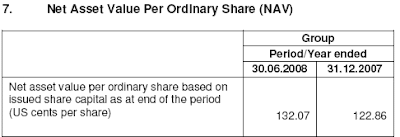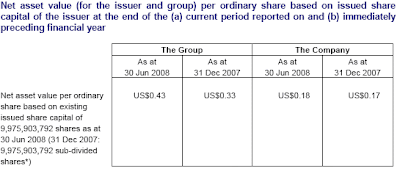Below is an opinion from Dennis Wee from www.HousingLoanSG.com. You should check out his site, some articles are great especially the one regarding the topic of "should you stretch your HDB loan". (Ans is yes of cos to the max...)
Quote: "In the last few months, many people have come out to say from time to time that "we are close to a bottom". I especially find remarks from Mr Wong from fundsupermart funny. Why? I've lost count how many times I heard him say something like that for the last 7 months since Mar 2008.
He would say something like that:"no one can pick the bottom, but markets are now looking cheap and we are either at a bottom or approaching one soon...."
From my observation, stock markets typically bottom with a "double bottom", it looks something like a "W" character. Can you see the "W" (double bottom formation) of the Dow chart below, the first bottom was in year 2002 at about 7,528 as I have marked out, the 2nd bottom was in Mar 2003.
Another thing you notice is that there are a "few months" separating the 2 bottoms, which give you enough time to buy stocks even if you have missed the second bottom.
My observation tells me that markets typically bottom after 3 things:
1. most people have run out of money to invest. (because they invested all their money too early).
2. the few who still have money, majority of them are too afraid to invest, because they have already lost a lot of money investing.
3. As mentioned, I observe that stock markets typically bottom when the economy is at its worst.
For example, in 1996 after markets peaked, it only bottom in Oct 1998.
In year 2000, after markets crashed, it only bottom in March 2003.
Singapore has just entered into a technical recession, and govt has come out to warn Singaporeans about bad times ahead.
Thus, it is clear that Singapore's economy has not reached the worst stage yet and thus, any stock market rallies in the meantime is likely to be a Bear Market Rally (trap) rather than recovery.
Let the Market Bottom Passes You ByAs mentioned, one way to reduce risk is to let the market bottom passes you by, instead of trying to pick the bottom. Of course, by letting the market bottom passes you, you might end up paying 10% to 25% higher prices for stocks. However, if each Bull Market Cycle is 3 to 5 years, and prices might go up 100% to 300% in each cycle, I would rather pay a higher price than risk catching a "falling knife" (you buy cheap, but prices get even cheaper).
"UnquoteSGDividends says: Well, so many experts saying this and that. We remember in early part of 2008 or end 2007, we hear so many so called GURUs mention that the stock market will pick up by end 1st quarter of this year. Later it did not materialise and they pushed it back to Mid-year 2008 and yet again it did not materialise. Now some GURUs are again saying that the market will pick up in mid-2009. So many wrong calls from so-called experts. The morale of the story is : As long as the company is cheap based on fundamentals like NTA, Gross Profit, strong balance sheet, high barrier to entries, unfair advantage, strong management (integrity), strong prospects , not overly dependent on a few customers or suppliers, good debt profile, porters five forces....e.t.c just whack your heirloom and life savings into such companies. ( Yes we are pretty risk-taking..we hear...cos we have a long time horizon). We don't see the point of catching a bottom....Our 21 cents worth. What Dennis says makes sense though..but we just don't bother about a bottom when investing..though we do still punt cos it looks cool if we are right. VIX Indicator!
Important: The objective of the articles in this blog is to set you thinking about the company before you invest your hard-earned money. Do not invest solely based on this article. Unlike House or Instituitional Analysts who have to maintain relations with corporations due to investment banking relations, generating commissions,e.t.c, SGDividends say things as it is, factually. Unlike Analyst who have to be "uptight" and "cheem", we make it simplified and cheapskate. -The Vigilante Investor, SGDividends Team
 The above is taken from money-and-girls.blogspot.com
The above is taken from money-and-girls.blogspot.com

 His Thoughts on the Economy
His Thoughts on the Economy


 4 October 08 - JP Morgan say OVERWEIGHT. " Price Target S$2.00"
4 October 08 - JP Morgan say OVERWEIGHT. " Price Target S$2.00" 























 See below: Current Asset(CA) greater then Current Liabilities(CL)! (while Cosco's CA is lower than CL)
See below: Current Asset(CA) greater then Current Liabilities(CL)! (while Cosco's CA is lower than CL)












 Current Assets : 11,530 VS Current Liabilities 116,790 ( 2nd column from right) See how much they have to repay at the third chart!
Current Assets : 11,530 VS Current Liabilities 116,790 ( 2nd column from right) See how much they have to repay at the third chart!


